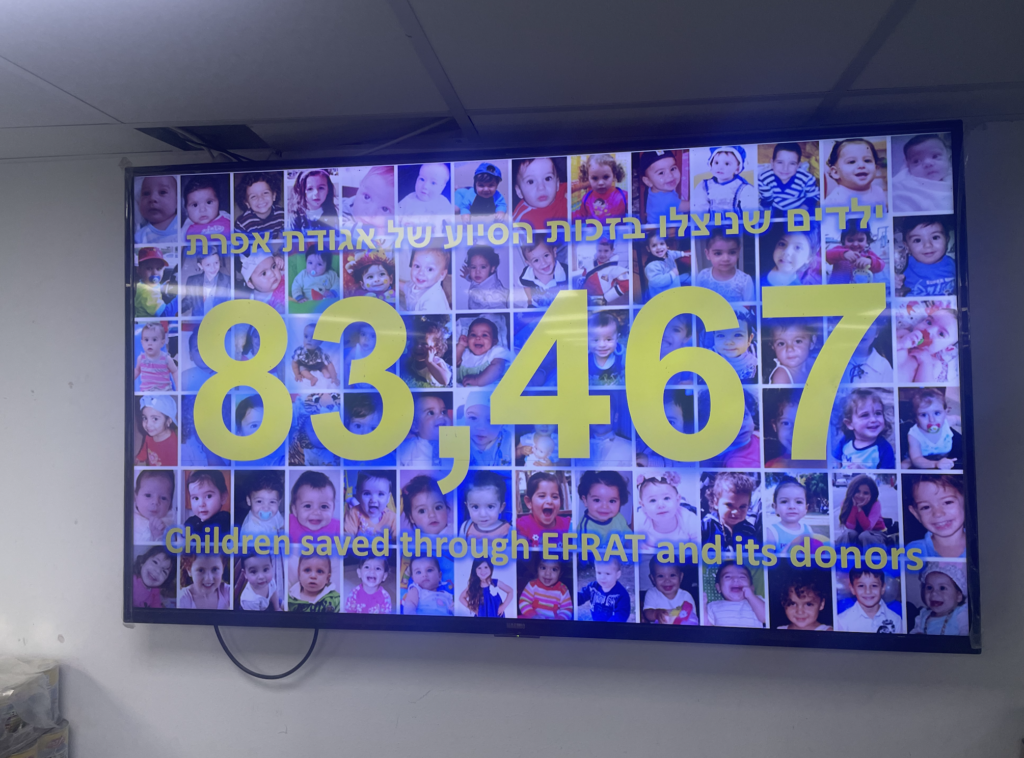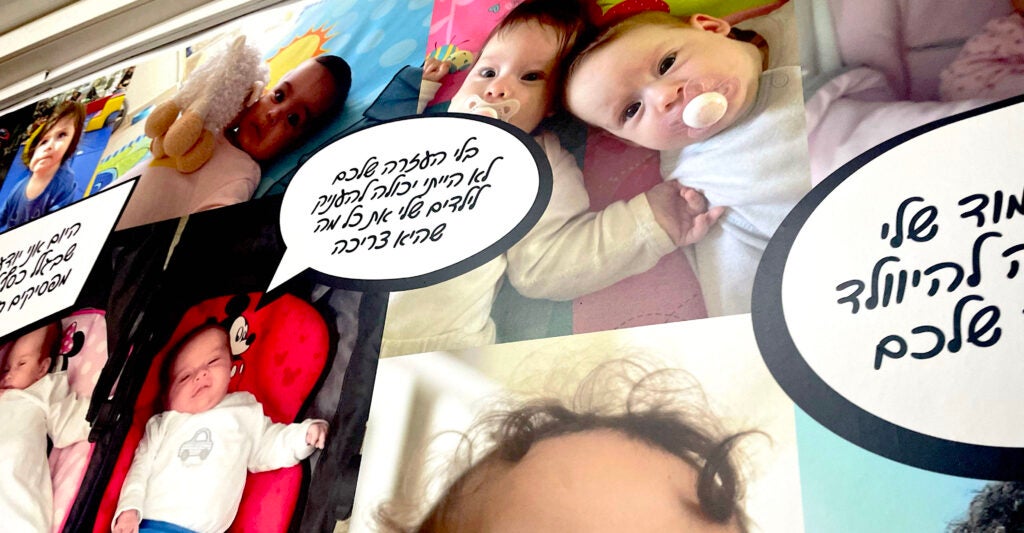JERUSALEM—Efrat sits in a quiet Jerusalem neighborhood, a pregnancy center housed in a modest-looking building with a noble goal: to give Jewish women the resources necessary to choose to save their babies.
Efrat has saved the lives of 83,467 children since its founding, according to the cheery signs on the wall in the pregnancy center’s storage center, where center Executive Director Nir Salomon energetically explained the pregnancy center’s mission to our visiting group of American Catholics.
The pro-life organization has helped at least 100 more babies come into the world since my early March visit to the center, Salomon shared in a phone interview Monday. He emphasized that Efrat aims to empower women to make their own choices about their babies without pressure from husbands, boyfriends, parents, or other outside influences.
“When a woman comes to us, we tell her, ‘You have an option to abort. It is legal in Israel. But you also have the option to have a child,'” he said. “And that is the unique proposition of Efrat.”

Efrat was founded by the late Holocaust survivor Herschel Feigenbaum, who believed “that our children are our future.” Feigenbaum wanted to create a nonprofit encouraging childbirth to replace the many Jewish children slaughtered throughout the Holocaust, the organization’s website explains.
That dream didn’t take off until Dr. Eli Schussheim came along in 1977 and officially launched the organization now known as Efrat, intending to offer women professional consultations on their pregnancies. Schussheim’s goal evolved into offering women even more than that—giving them the choice not to abort their unborn babies, and empowering them to choose life through resources and opportunities.
Many Israeli women considering abortion already have children, Salomon said, noting that 56% of the women Efrat helps are married. Often, a woman’s husband has told her that they cannot afford another child. Efrat wants these families to know that they can, in fact, afford another baby—and Efrat will help make that baby’s entry into the world smoother.
“We will provide everything they need so that an additional baby is not an additional financial expense,” Salomon said. “We can’t solve all of your money problems, but the baby won’t be an additional expense.”
A family’s fear may boil down to something as simple as a crib, Salomon said. The family cannot afford a crib and thus feel like they cannot afford a child. That simple act of providing Israeli families with that crib, or even with diapers or formula, is a major game-changer.
“We bring them to this room and we show them, this is what you are going to get when the baby is born,” Salomon explained, as he walked about the storage room, pointing to diapers, baby formula, strollers, bath basins, and more.
Concerns do not end there, of course. Many families want to know how they will afford their baby after he or she is born. Here Efrat also has an answer—for the first two years after the baby’s birth, Efrat sends the families a box of baby products and food every month.
Those packages are put together by volunteers, many of whom are Israeli youth. According to Efrat’s estimates from a few years ago, the center sends eight to 11 baby packages a day and over 3,500 food packages every month.
The center plans to soon provide free housing to take in pregnant women whose families have turned them away. Expectant mothers can live in the rent-free lodgings during their pregnancy and for six months afterward.
Efrat also wants the mother to become physically, emotionally, and financially secure—through the center’s new “Working Moms” program, Efrat performs vocational assessments for the women and seeks to connect them with government bodies and place them in jobs where they can flourish.
“We started these programs because we felt responsible for the next stage,” Salomon said.
The pregnancy center’s volunteers offer emotional support and counseling as well as the aforementioned financial support. If a doctor has recommended that a woman abort her unborn baby, Efrat’s team of medical professionals will offer her a free second opinion—a service informed by one of the babies that Schussheim saved earlier in his career by offering a mother a second opinion (an occurrence that helped Efrat come into conception).
“When a woman dials our number, it’s because poverty has cornered her into believing that abortion is her only option,” one of the center’s pamphlets reads. “For thousands of women and their babies, your help can mean the difference between terrifying hopelessness and a joyous, independent future.”
Abortion is legal in Israel, but women must first go through an “abortion committee” to receive permission to get the abortion, Faydra Shapiro, a senior fellow with The Philos Project, shared with The Daily Signal.
“In order to get an abortion funded through the public system in Israel, a woman needs to present her case to a committee that must authorize the procedure,” Shapiro said. “The committee is made up of social workers and doctors.”
Schussheim, who died in 2021, reportedly wanted one of those committee members to be a dentist.
“They said, ‘Why should it be made up of a dentist?’” Salomon recalled. “He says, ‘Because dentists try to do anything before they uproot a tooth.’”
Shapiro, a specialist in contemporary Jewish-Christian relations, said that “criteria to authorize an abortion include being young (under 18), being older (over 40), severe medical problems with the unborn child, and the pregnancy as a result of an illicit union (being unmarried, adultery, incest etc).”
Almost all requests are granted, even if married women lie and say they got pregnant as the result of an affair, Shapiro said.
“This up to 24 weeks gestation,” she noted. “After 24 weeks, the committee process is different and more stringent.”
When the U.S. Supreme Court overturned Roe v. Wade, Israel’s former health minister, Nitzan Horowitz, called for abolishing the committees in an attempt to “show how liberal he is,” Salomon explained. “They brought us in to counter him.”
Efrat suggested an alternative to the committees: a mandatory 72-hour cooling off period that begins after the mother meets with a social worker, who will listen to her and find out if the abortion is truly what the woman wants.
“We are not willing to rubber-stamp abortions,” Salomon emphasized, noting that Efrat encouraged the health minister to create pamphlets (from the state, not from Efrat) showing women the wide range of options available to help them care for their child—including things like day care.
In spite of Efrat’s efforts, Israel ultimately made it easier for women to obtain abortions through a policy approved in late June giving women access to abortion pills through the country’s universal health system, allowing women to abort their unborn babies at local health centers rather than at hospitals and surgical clinics, and exempting women from appearing before the special committees.
The committees will review women’s requests for abortions digitally and will only have an in-person hearing if they deny a mother an abortion, according to The Washington Post. The publication noted that it is highly unlikely the committee will deny a woman an abortion.
Salomon took issue with the Israeli politicians who latched on to the reversal of Roe v. Wade and portrayed Judaism as pro-abortion. Their representations are not true, he insisted.
“It is unfortunate that that is the position they have taken,” he said. “By no means is Judaism a pro-abortion religion.”
Israelis also view abortion differently than citizens in the United States, where demonstrations took place for months following the leak of the draft opinion indicating Roe v. Wade would soon be overturned.
Shapiro notes that abortion in Israel is “officially controlled” in the sense that “there is no ‘abortion on demand.’”
But at the same time, most women who want to abort their babies are allowed to do so.
“First, Judaism not only permits but in some cases actually requires abortion if the life of the mother is at actual risk from her unborn child,” she said. “Second, there is a desire on behalf of the religious establishment to avoid children of illicit unions: a child born as a result of adultery or incest (this does not include a child born to an unmarried woman) is mamzer in Jewish law and only allowed to marry another mamzer.”
“Third,” she continued, “Israel is generally a country that both has strong pro-natal policies and values and at the same time has a quite liberal sense of personal freedoms and choice. These issues make the situation quite complex and unlike that of the U.S.”
According to Shapiro, “abortion is simply not part of the political landscape” in Israel.
“The religious Christian pro-life arguments about when life begins and the murder of the unborn simply do not work here,” she said.
American and Israeli thoughts on abortion may differ, but Efrat has had its fair share of support from pro-life politicians. Near the entrance of the building, on the inside walls, pictures depict Schussheim with a slew of lawmakers, including Democratic West Virginia Sen. Joe Manchin, Republican Nebraska Sen. Deb Fischer, Republican Ohio Sen. Rob Portman, Republican South Carolina Sen. Tim Scott, Republican Utah Sen. Mike Lee, and former House Speaker Paul Ryan.
“I wish I were as successful here in the United States as you are in Jerusalem,” former Republican Kentucky Sen. Jim Bunning, who died in 2017, is quoted saying. Salomon told The Daily Signal that some of these politicians visited Efrat themselves, while others attended an Efrat event in Washington, D.C.
Efrat seeks to serve women outside Israel as well. The organization has fundraising arms internationally in Brooklyn, New York, and in Toronto, according to the center’s literature, and Salomon said that Efrat plans to put down roots in Hollywood, Florida—and hopefully either New York City or Los Angeles next.
He pointed to the thousands of pregnancy resource centers throughout the United States, noting that many of these centers are Christian or religiously inclined. For Jewish women, Salomon said, it can be confusing and alienating to go to hear rhetoric about Jesus Christ—even though he acknowledged that such rhetoric comes from an incredibly loving place.
“Christians have become more and more interested” in the idea of Jewish pregnancy centers, he explained, adding that the common sentiment he hears is, “We want to support Israel and we want to support life.”
“I don’t see any other greater meeting of those two things than what Efrat is,” he said.
Have an opinion about this article? To sound off, please email letters@DailySignal.com, and we’ll consider publishing your edited remarks in our regular “We Hear You” feature. Remember to include the URL or headline of the article plus your name and town and/or state.
